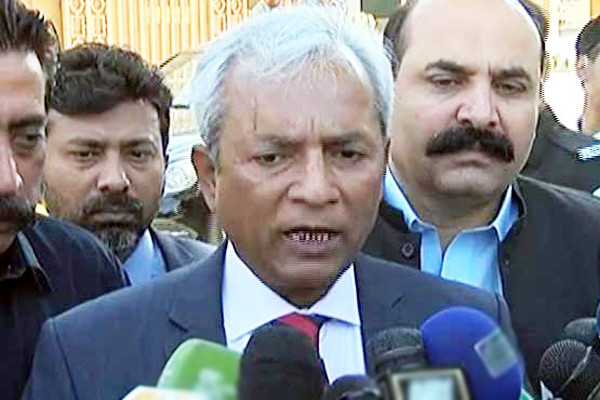
When a well-respected judge of Pakistan’s Supreme Court on Thursday likened Prime Minister Nawaz Sharif’s government to the “Sicilian mafia”, the reaction from the Prime Minister’s Office was swift and predictable.
And yet, events leading up to the honourable judge’s remarks were clearly without precedent in recent memory, raising the troubling prospect of a ruling structure seeking to trample over one institution after another.
The sequence of events leading to Thursday’s development were triggered when Senator Nihal Hashmi, a well-known loyalist of Sharif’s and a member of the Upper House of the parliament, publicly threatened judges and investigators responsible for examining offshore wealth of the prime minister’s three children. In a set of widely publicised remarks, Hashmi promised to exact revenge from public officials and even their children for their pursuit of the ongoing investigations.
The case presents a shining example of the rapid deterioration of law and order in Pakistan, where supposedly independent officials tasked with investigating the high and mighty appear to be increasingly at risk of having their authority illegally challenged. Though Sharif took little time in summoning Hashmi for a reprimand, following his remarks, the matter presents a dangerous possibility of a wider trend now underway.
Investigations triggered by the so called “Panama leaks”, which allegedly linked Sharif’s three children to exorbitantly expensive property in London, have raised plenty of eyebrows across Pakistan. Exactly how long will Pakistan continue to tolerate cases of corruption among its elites, without a powerful counter-effort to curb the trend is a frequently-asked question.
But rather than pontificate over the lessons to be drawn from the “Panama leaks” revelations, Sharif and others among the ruling elite have chosen to remain defiant. So far, there appears to be little effort underway to tackle the all-too-pertinent question of placing powerful curbs around affluent Pakistanis, beyond just Sharif’s three children with evidence of wealth parked overseas.
An unbridled flow of such wealth from Pakistan to overseas destinations will continue to undermine the country’s already weak economy at a time when exports have staggered recently while imports have shot up. But reversing the trend is not just about economic policies alone. It will also depend largely on the ability of Pakistan’s ruling elite to set aside their own economic interests on foreign soils, and allow a full-scale reversal of the trend.
At the same time, Hashmi’s outburst must raise deeply troubling questions over the quality of security surrounding stakeholders from key institutions, notably the Supreme Court to other branches of government. The manner in which he unleashed his threat must raise questions over the ability of the state to protect key public officials. Pakistan’s history is rife with examples of senior officials having been targeted in the past by successive regimes in a number of ways including physical attacks.
Though some in Sharif’s ruling Pakistan Muslim League — Nawaz (PML-N) have defended Hashmi and argued that his remarks were no more than an outburst in a state of rage, the concerns over this sorry episode cannot be ignored.
On the one hand, if indeed Hashmi is eventually seen to have got off the hook, the episode in itself will only unleash a troubling message. For now, Sharif has forced Hashmi to resign from the Senate. But any such punitive measure needs to remain permanent while a permanent stop must be put on any possibility of Hashmi making a comeback from the political cold.
On the other hand, acceptance of the use of threats, as part of Pakistan’s acceptable democratic norms, will likely create a major upset. Rather than acceptance of irate behaviour, there must be tough enforcement of law against such individuals, keeping the element of police and legal prosecution central to the way forward.
Meanwhile, for Sharif, this case in itself has shone the light on a wider malaise surrounding Pakistan’s journey towards civilian rule. It is clear that rather than consolidating civilian rule at a time when Pakistan faces a huge list of challenges, the reverse in the shape of an erosion of the state appears to be in progress. Even if the Hashmi episode eventually gets settled, Pakistan is badly in need of a cross-party consensus to establish a framework for the conduct of politicians.
A failure to achieve such a consensus will only reverse whatever progress has been made in Pakistan’s journey towards attaining a stable democratic rule. Hashmi’s utterances have badly exposed a sorry element of Pakistan’s democratic picture at a time when the matter of civil-military relations remains under continuous popular review, while the performance of the government leaves many gaping holes.
The kind of utterances heard from Hashmi have given ammunition to ordinary Pakistanis to ask a deeply compelling question: How can Pakistan’s political leaders claim to have successfully embarked on a journey to ultimately consolidate a stable civilian rule when individual members of parliament show such impunity towards key institutions of the state?
That question can just not be answered without reconciling with Pakistan’s history and present-day trends. During a previous rule as Pakistan’s prime minister, members of Sharif’s party were widely known to have attacked the supposedly well-protected premises of the Supreme Court in Islamabad. Given that kind of a history, the prime minister needs to be additionally cautious about current trends surrounding his followers. And once Sharif sets the pace, other political leaders across the board will have to follow in the interest of radically changing Pakistan’s outlook on the democratic front.
Farhan Bokhari is a Pakistan-based commentator who writes on political and economic matters.










